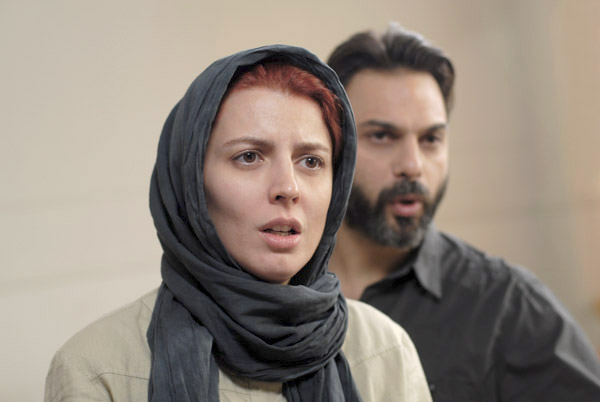
Leila Hatami and Peyman Moadi in A SEPARATION (Habib Madjidi/Sony Pictures Classics)
![]() A Separation opens with a marriage in crisis. Testifying testily, the wife explains to a judge that she wants to leave the country so their 11-year-old daughter will have more opportunities. The husband interrupts to argue with exasperation that he’s constrained to stay for his widowed father with Alzheimer’s. This seems like a universal conflict as both face the camera, but it is heightened when the setting is revealed as an Islamic family court in Tehran, and the rules governing the couple’s lives are that much more circumscribed. As the details of their frustrating efforts to find a solution are played out within this very specific time and place, writer/director Asghar Farhadi suspensefully finds that the ensuing complications are only incidentally about living in Iran and are much more about the unpredictability and volatility of human nature.
A Separation opens with a marriage in crisis. Testifying testily, the wife explains to a judge that she wants to leave the country so their 11-year-old daughter will have more opportunities. The husband interrupts to argue with exasperation that he’s constrained to stay for his widowed father with Alzheimer’s. This seems like a universal conflict as both face the camera, but it is heightened when the setting is revealed as an Islamic family court in Tehran, and the rules governing the couple’s lives are that much more circumscribed. As the details of their frustrating efforts to find a solution are played out within this very specific time and place, writer/director Asghar Farhadi suspensefully finds that the ensuing complications are only incidentally about living in Iran and are much more about the unpredictability and volatility of human nature.
The wife, Simin (Leila Hatami), is annoyed because she has finally obtained a time-limited visa to take their daughter (played by the director’s spirited daughter Sarina Farhadi) overseas. But the judge rules that she must have the permission of her husband, Nader (Peyman Moadi), who wants custody. Trading charges of selfishness, the wife moves out of the apartment, and her husband has to get back to his bank job, so he hires a daily caretaker, Razieh (Sareh Bayat), for his father. The aide, wrapped in a chador, is so nervous at working in the intimacy of someone else’s home that she consults an imam about the appropriateness of tending to a man who is not a relative. Further, she doesn’t tell Nader that her young daughter will be accompanying—and distracting—her at work. There’s more that she conceals by the time the father is found dangerously wandering outside in the traffic.
While her employer is understandably furious at this dereliction, his physical response to her actions is ambiguous, and the rest of the film escalates the ramifications of what he did, what she did or did not tell him, and the consequences for both their families. Did he emotionally overreact? What else has she lied about? Who do you trust? The audience is rocked back and forth in sympathy between their changing positions, particularly when Razieh’s agitated and unemployed cobbler husband, Hodjat (Shahab Hosseini), becomes involved in the dispute. He ratchets up the pressures on all of them, drawing the neighbors, in-laws, and the legal system into the family crisis.
Like the family in Farhadi’s About Elly (2009), the separating couple is middle class, and the class conflict between the two families is as an important element as their differences in religious observance. As in his Beautiful City (2004), each character is in a tangled (perhaps too tangled) predicament, and none is a one-dimensional stereotype. Beyond the comparison to Rashomon-like storytelling, each actor in the superb ensemble appears in the foreground in turn. The point of view changes minute by minute. Filmed in a convincingly documentary style, the frictions unfold naturally. At a New York Film Festival press conference, the director noted there was no improvisation but meticulous rehearsals, which included the cosmopolitan actress Bayat wearing the chador for months to get comfortable portraying that lifestyle realistically.
Besides passing muster for Iran to make it the official selection for the Best Foreign-Language Film Academy Award, A Separation is one of the best films of the year in any lingo.
















Leave A Comment